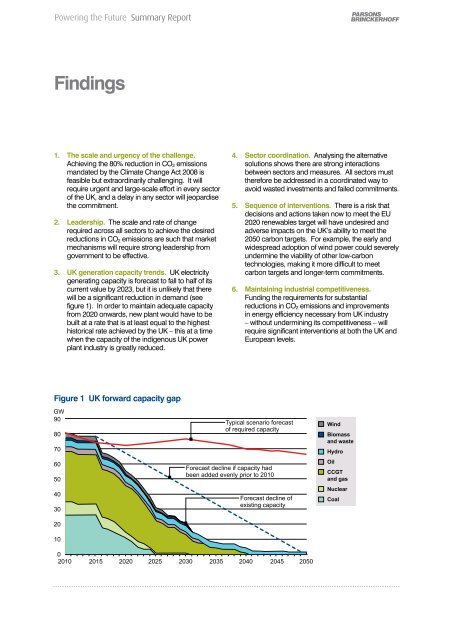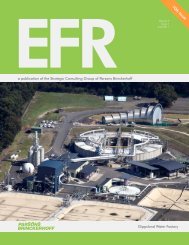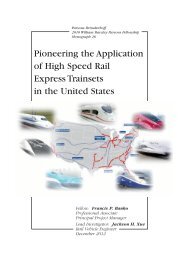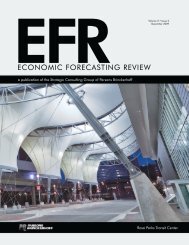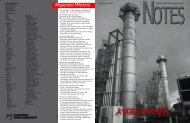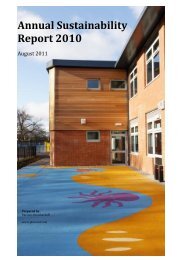Powering the Future Summary Report - Parsons Brinckerhoff
Powering the Future Summary Report - Parsons Brinckerhoff
Powering the Future Summary Report - Parsons Brinckerhoff
You also want an ePaper? Increase the reach of your titles
YUMPU automatically turns print PDFs into web optimized ePapers that Google loves.
<strong>Powering</strong> <strong>the</strong> <strong>Future</strong> <strong>Summary</strong> <strong>Report</strong><br />
<strong>Powering</strong> <strong>the</strong> <strong>Future</strong> <strong>Summary</strong> <strong>Report</strong><br />
Findings<br />
1. The scale and urgency of <strong>the</strong> challenge.<br />
Achieving <strong>the</strong> 80% reduction in CO 2 emissions<br />
mandated by <strong>the</strong> Climate Change Act 2008 is<br />
feasible but extraordinarily challenging. It will<br />
require urgent and large-scale effort in every sector<br />
of <strong>the</strong> UK, and a delay in any sector will jeopardise<br />
<strong>the</strong> commitment.<br />
2. Leadership. The scale and rate of change<br />
required across all sectors to achieve <strong>the</strong> desired<br />
reductions in CO 2 emissions are such that market<br />
mechanisms will require strong leadership from<br />
government to be effective.<br />
3. UK generation capacity trends. UK electricity<br />
generating capacity is forecast to fall to half of its<br />
current value by 2023, but it is unlikely that <strong>the</strong>re<br />
will be a significant reduction in demand (see<br />
figure 1). In order to maintain adequate capacity<br />
from 2020 onwards, new plant would have to be<br />
built at a rate that is at least equal to <strong>the</strong> highest<br />
historical rate achieved by <strong>the</strong> UK – this at a time<br />
when <strong>the</strong> capacity of <strong>the</strong> indigenous UK power<br />
plant industry is greatly reduced.<br />
4. Sector coordination. Analysing <strong>the</strong> alternative<br />
solutions shows <strong>the</strong>re are strong interactions<br />
between sectors and measures. All sectors must<br />
<strong>the</strong>refore be addressed in a coordinated way to<br />
avoid wasted investments and failed commitments.<br />
5. Sequence of interventions. There is a risk that<br />
decisions and actions taken now to meet <strong>the</strong> EU<br />
2020 renewables target will have undesired and<br />
adverse impacts on <strong>the</strong> UK’s ability to meet <strong>the</strong><br />
2050 carbon targets. For example, <strong>the</strong> early and<br />
widespread adoption of wind power could severely<br />
undermine <strong>the</strong> viability of o<strong>the</strong>r low-carbon<br />
technologies, making it more difficult to meet<br />
carbon targets and longer-term commitments.<br />
6. Maintaining industrial competitiveness.<br />
Funding <strong>the</strong> requirements for substantial<br />
reductions in CO 2 emissions and improvements<br />
in energy efficiency necessary from UK industry<br />
– without undermining its competitiveness – will<br />
require significant interventions at both <strong>the</strong> UK and<br />
European levels.<br />
7. Primary reduction measures. Comparing <strong>the</strong><br />
main CO 2 reduction options shown in figure 2<br />
indicates that <strong>the</strong> following measures are essential:<br />
• rapid and large-scale switch of cars and light<br />
goods vehicles to electric battery power<br />
• radical improvement in industrial energy efficiency<br />
• large-scale application of renewable heat using<br />
solar energy and making maximum use of<br />
available biomass<br />
• intensive and substantial improvement in <strong>the</strong><br />
insulation of new and existing homes and<br />
buildings<br />
• development and application of carbon capture<br />
and storage (CCS) for large emitters in <strong>the</strong><br />
industry sector, in addition to its application for<br />
coal-burning power plant<br />
8. Secondary reduction measures. Wind power,<br />
nuclear power and solar photovoltaic (PV) are<br />
collectively essential to <strong>the</strong> decarbonisation of<br />
electricity production, reducing CO 2 emissions by<br />
over 100 MtCO 2 /yr from current levels. However,<br />
as electricity will be largely decarbonised by 2050,<br />
<strong>the</strong> value of any individual low-carbon power<br />
generating measure will be low, as shown in<br />
figure 2. The choice between <strong>the</strong>se alternatives<br />
must <strong>the</strong>refore be made on operational, economic<br />
and energy security grounds.<br />
9. Avoiding technology dependence. Choices<br />
between alternative measures can result in<br />
excessive dependence on key technologies. For<br />
example, <strong>the</strong> omission of a nuclear programme<br />
would result in heavy dependence on CCS<br />
technology, which is currently unproven at <strong>the</strong><br />
scale required for a major power plant.<br />
10. Avoiding fuel dependence. Fuel diversity issues<br />
can be managed if a holistic view of UK energy use<br />
is taken. The reference scenario (<strong>the</strong> base case<br />
for evaluation of alternative options) achieves a<br />
good diversity of fuels by substituting electricity for<br />
oil in <strong>the</strong> transport sector and by having a flexible<br />
electricity generation mix.<br />
11. Quick wins. Because of <strong>the</strong> scale of <strong>the</strong><br />
measures, improved building insulation, improved<br />
industry energy efficiency and greater use of<br />
electric vehicles all offer valuable reductions in<br />
carbon emissions by 2020. Early action is needed<br />
to deliver <strong>the</strong>se reductions.<br />
Figure 1 UK forward capacity gap<br />
Figure 2 Value of measures to 2050 CO 2 emission reductions<br />
05:06


